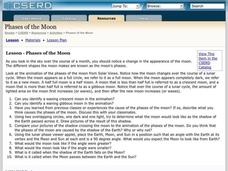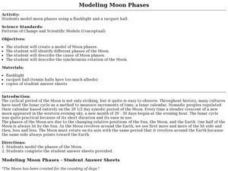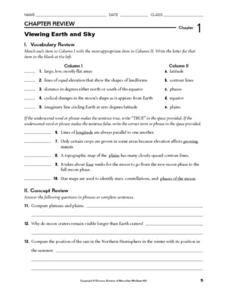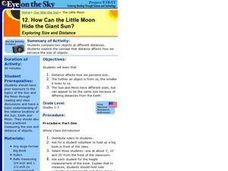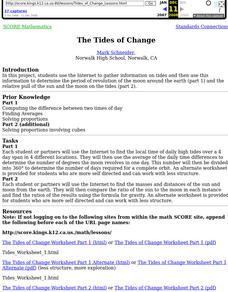Curated OER
Phases of the Moon
Students create a model of the phases of the Moon by giving students pictures of the phases of the Moon, a picture of the Earth, and a picture of the Sun. They then take a picture, and stand in correct place to make the phases of the...
Curated OER
Modeling Moon Phases
Students identify the phases of the Moon and the synchronous rotation. For this hands on lesson students will create a model of the Moon.
Curated OER
Why is There a Tidal Bulge Opposite the Moon?
Students simulate how the Moon causes ocean tides. In this earth science lesson, students calculate gravitational acceleration using a mathematical formula. They compare the force of attraction between the Earth, Moon and Sun system.
Curated OER
A Model Solar System
If Earth is modeled by a grapefruit, what planet could be represented by a golf ball? This activity uses everyday and not-so-everyday objects to create a model of the Solar System.
Curated OER
Universal Gravity and Kelper's Laws Worksheet
High school physicists apply their knowledge of planetary motion. Using Kepler's three laws, Newton's law of universal gravitation, and the provided properties of the moon, sun, and Earth, they proceed to solve 23 problems. An answer key...
Curated OER
Planets: Comparatives and Superlatives
In this ESL activity worksheet, students practice using comparatives and superlatives as they respond to 7 multiple choice questions.
Curated OER
Planet Interiors
Students compare and contrast the Earth's interior with 2 other planets by looking at images on the computer. In this planet interiors lesson plan, students write a paper about their findings.
Curated OER
Viewing Earth and Sky
In this earth and sky learning exercise, students review terms associated with map reading. Students also review topographic maps and how contour lines represent elevation. This learning exercise has 5 matching, 5 true or false, 5 fill...
Curated OER
Our Solar System
In this solar system worksheet, students complete a database comparing the 9 different planets' mass, surface temperature, rotation period, orbital period, moons, and distinguishing features. This worksheet is a graphic organizer.
Curated OER
Lunar Lollipops
Students simulate the phases of the moon using a lamp and styrofoam balls. In this lunar phases lesson, students stand around a lamp and act as Earth. They hold styrofoam balls and rotate to show the phases of the moon.
media.yurisnight.net
Science Lesson Plan: Our Solar System: I Wonder?
Ever wonder why Pluto isn't considered a planet? Or how large the Earth is compared to the other inner planets? Explore the universe with a series of projects that simulate different aspects of our solar system. The activities require...
Curated OER
How Can the Little Moon Hide the Giant Sun? Exploring Size and Distance
Students compare two objects at different distances. They explore the concept that distance affects how we perceive the size of objects.
Curated OER
Moon Phases
For this moon worksheet, students fill in the different phases on the moon on a diagram and label each phase. Students compare a solar and lunar eclipse. This worksheet has 2 fill in the blank and 3 short answer questions.
Curated OER
Moons
Students practice rote counting to 20. After a lecture about the planets and the moons that surround them, they identify the number of moons surrounding various planets. Students compare and contrast the quantity of moons surrounding...
Vosonos
Interactive Minds: Solar System
Travel through space as you learn about the galaxy, solar system, planets, and much more. An extensive resource for studying astronomy in upper-elementary and middle school classrooms.
Curated OER
Sky Watchers: Ancient Astronomers
Middle schoolers close their eyes and picture the sky. They are asked to brainstorm things they may see in the course of a night and day, such as the movement of the sun, moon, and stars. Students work in groups to coduct their...
Curated OER
Tides of Change
Students use the Internet to gather information on tides and then use this information to determine the period of revolution of the moon around the earth (part 1) and the relative pull of the sun and the moon on the tides (part 2).
Curated OER
The Night Sky
Third graders develop questions they have about the solar system. After being read a book, they view and discuss different constellations in the sky. In groups, they are given a piece of butcher paper and glow in the dark crayons in...
Curated OER
Getting to Know Saturn: The Saturn System
Students compare and contrast Earth and Saturn's planet features. For this space science lesson, students draw a diagram of the solar system and identify the different components. They complete a Saturn system scavenger hunt and Venn...
Curated OER
Comparing Eclipses
In this eclipses instructional activity, students will compare diagrams of a total solar eclipse with a total lunar eclipse. Students will complete 6 short answer questions based on these diagrams.
Curated OER
Measuring the Speed of Light
Learners explore physics by completing measurement problems in class. In this speed of light lesson, students discuss the importance of knowing the speed of light and how it affects many aspects of human life on Earth. Learners identify...
NASA
Collecting Electromagnetic Radiation
Astronomy is literally over your head, but this lesson will explain how we study it. Young scientists make telescopes, calculate and compare the light gathering power of lenses, and simulate detection of infared radiation. Materials...
University of Colorado
Space Travel Guide
Neptune takes 164.8 Earth years to travel around the sun. In the fifth of 22 lessons, young scientists create a travel guide to a planet in our solar system. They provide tips for others on what to bring, what they see, and their...
Curated OER
Learning Lesson: Moonlight Serenade
Students complete experiments as they act as the earth. They observe how different angles affect the phases of the moon seen by us. They discuss the differences in light and dark.


